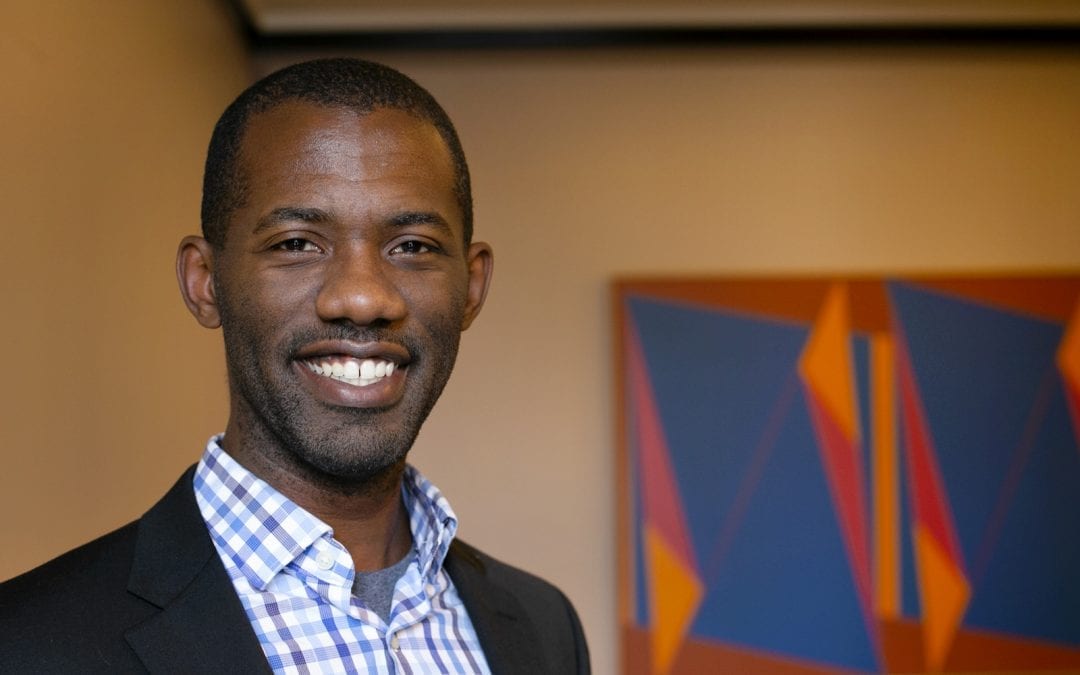This quote is one of my favorites because it paints a picture of legacy. We often misconstrue sentiments like this one by making them conditional. Success is a constantly advancing target, and so it can feel like we’re not yet successful, and thus don’t yet focus on those coming behind us. Particularly as a graduate student or postdoctoral research fellow, it may seem like you haven’t yet reached success, and like it’s too early to advocate for others.
Advocacy is one of five tenets of the Edward A. Bouchet Honor Society, which honors the first African American to earn a Ph.D. from any university in the United States. Dr. Bouchet completed undergraduate and graduate studies at Yale, and taught hundreds of students over a 40-year career. In addition to exhibiting exemplary scholarship, leadership, character, and service, Bouchet tirelessly advocated for his students. Although he did not teach at the university level, he mentored students who advanced scholarship and broke color barriers in industry and academia. In other words, he advocated for broader access than he experienced.
Within the Bouchet Society, we define advocacy as broadening access to graduate education and academic resources, serving as a mentor, and increasing awareness of educational inequities. These ingredients make for effective advocates; if implemented widely, they could transform the academy into the diverse scholarly community it must be to serve a diversifying society.
Broadening access means opening doors wider for students from all backgrounds. In the summer of 2015, a handful of minority graduate students in engineering at UC Berkeley gathered to discuss a potential workshop for prospective graduate school applicants. Starting from vague notions of what we would have liked to see as applicants, we developed Bay Area Graduate Pathways to STEM (GPS), a symposium inspiring diverse talent to become the next generation of innovative leaders through advanced engineering and science degrees. Four years later and with the vital support of staff members, administrators, and volunteers, GPS is co-sponsored by Berkeley Engineering and Stanford Engineering and has reached over 730 students. This large event impacting hundreds of applicants started with a handful of graduate student advocates. You can be an advocate wherever you are, regardless of your position in the academic hierarchy.
Mentoring helps advance and retain diverse scholars as they navigate the academy. These effects have been documented in literature1,2 and have also improved my own career, from my elementary school teachers advocating for me to take algebra early to my graduate school mentors writing me letters of recommendation for faculty positions. You can be a mentor at varying levels of commitment in almost any research or teaching setting. In research groups, we can facilitate introductory experiences for diverse undergraduates and debunk myths that excellent academic researchers are born, not trained. In the classroom, we can ensure that all students are heard by establishing classroom norms that facilitate equitable, inclusive participation.
Mentoring can be intimidating for mentors and mentees alike. We all win by acknowledging that having multiple mentors makes success more likely. The National Center for Faculty Development and Diversity has a mentoring map to help mentees define their mentor relationships in categories such as reviewers, sponsors, and role models. As mentees, we can ask for specific advice and time-bound interactions. As mentors, we can think about what role to fill at distinct times for different mentees. Mentoring does not have to be forever; even limited mentoring can have a profound and long-lasting impact.
Advocacy also involves equipping majority populations to foster inclusive environments. Practically, scholars from all disciplines can learn about barriers they may not face personally by reading diversity education literature and field-specific diversity articles.3 Start a journal club focused on diversity, equity, and inclusion in your research group or department, and invite education scholars to give seminars. Rackham facilitates several entry-level diversity workshops—attend and invite colleagues. It is never too early to start advocating for broader access for scholars from all backgrounds. Everyone has something to learn about how to foster more inclusive environments, regardless of their experiences.
Because we all benefit from diverse ideas and perspectives, we all should play a role in removing barriers to that benefit. You don’t have to be part of an underrepresented group to be an advocate. In fact, you can lessen the disproportionate load on underrepresented scholars to be advocates and add extra credence to existing advocacy efforts.
Advocacy helps create the diverse teams we need in academia to conduct world-class research and teaching. In the spirit of Dr. Bouchet, we can all contribute to broadening access to educational resources, mentoring, and overcoming educational inequities. No matter what stage we’re at, there’s a door behind us to open a bit wider.
- Cullen, D. L.; Luna, G. Women Mentoring in Academe: Addressing the Gender Gap in Higher Education. Gend. Educ. 1993, 5 (2), 125–137.
- Blackwell, J. E. Mentoring: An Action Strategy for Increasing Minority Faculty. Academe 1989, 75 (5), 8–14.
- Blaney, L.; Perlinger, J. A.; Bartelt-Hunt, S. L.; Kandiah, R.; Ducoste, J. J. Another Grand Challenge: Diversity in Environmental Engineering. Environ. Eng. Sci. 2017, 35 (6), 568–572.
The Bouchet Society is a network of preeminent scholars who exemplify academic and personal excellence, foster environments of support and serve as examples of scholarship, leadership, character, service, and advocacy for students who have been traditionally underrepresented in the academy.
The views expressed in this post are the author’s and do not necessarily reflect those of Rackham Graduate School or the University of Michigan.

